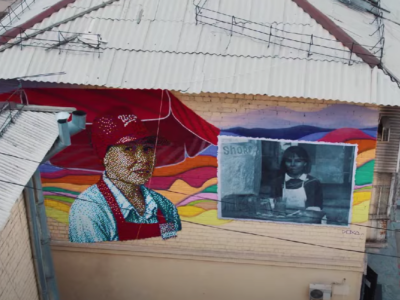Ethno-nationalism. It starts with arguments about language and ends with conflicts over land. Usually, the period in between is peppered with lies. For this very reason, the role in Kyrgyzstan played by independent media organizations such as kloop.kg in separating fact from disinformation is a crucial one.
Their first hand coverage [ru] of the rallies that took place in the village of Mayevka was balanced and responsible, in sharp contrast to a glut of reports that had surfaced in Internet forums and foreign news agencies the same day, claiming that the rallies were a premeditated attack on the village's ethnic Russian minority.
Rumours that a school in the northern town of Kant had been burned down and that ethnic clashes had taken place in Bishkek were likewise proved to be false.
Nevertheless, five people of different ethnic backgrounds lost their lives in the Mayevka rallies, providing evidence – if any was needed – that the post-revolutionary condition of this Central Asian nation is still far from stable.
And while sensationalism and hysteria distort the overall picture to the point of extremes, examples of nationalist, discriminatory sentiment can be found in other parts of the country. Sergey Vysotsky [ru], a journalist based in the lakeside town of Karakol, Issyk-Kul region, reports on an exercise in the deliberate exclusion of non-Kyrgyz speaking Russian journalists at a press conference with the new local government. In a piece titled “The new outlook of the new government” Vysotsky writes [ru]:
The Press Conference held for Karakol journalists with the governor of Issyk-Kul region, Mirbek Asanakunov… turned into a noisy debate, and almost grew into a scandal.
Participating Russian-speaking journalists asked to meet in an accessible language throughout, but faced a lack of understanding of their views on the part of the new leadership of the Kyrgyz language journalists and newspapers.
“Any person living in Kyrgyzstan is obliged to know the Kyrgyz language,” said the regional correspondent of the newspaper Kyrgyz Tuusu, Jeenbaev Turk. “It is time to hold all meetings only in the national language. “
Vysotsky adds that the press conference continued without the use of an interpreter for the non-Kyrgyz speaking journalists.
Russian remains as the ‘official’ language of Kyrgyzstan while Kyrgyz is the ‘state’ language. Only 68.9% of the population are ethnic Kyrgyz, comparitively few compared to other, more homogenous Central Asian nations and much of the capital Bishkek's population considers Russian as its first language. Additionaly, due to its predominance during the Soviet period, many ethnic minorities have been brought up to know Russian, not Kyrgyz.
For those interested in the situation regarding land ownership in the country, a well informed piece written by blogger Akyikat [ru] titled ‘Stop Squatting!’ provides an interesting insight into some of the various interests involved in land seizure and occupation, a theme which is coming to the forefront of political life in Kyrgyzstan at the moment. In conclusion the author makes a plea to the provisional government to move quickly on the issue :
“Please initiate a moratorium on the granting of land plots for individual housing construction and start a mortgage program for the erection of a multi-storey public housing! We want to live in a beautiful city and not be afraid to visit all its parts,” the user posts in reference to the recent instability in some of the capital Bishkek's surrounding villages.”
Yet other users are shunning such weighty questions entirely, instead choosing to celebrate the arrival of Spring in this spectacularly beautiful, mountainous country.






